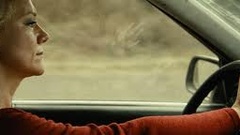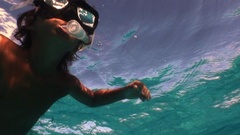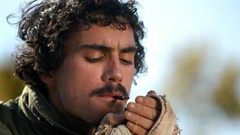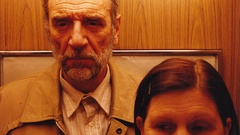Hiroshima (Uruguay) (2009)
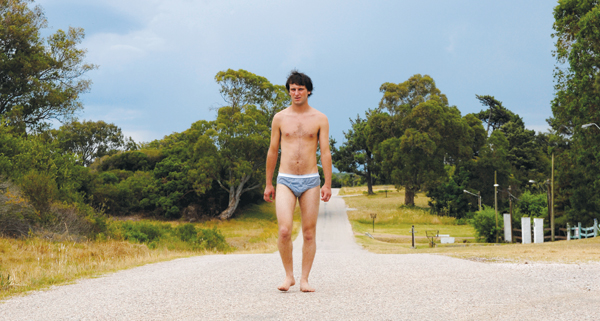
Part of the New Latin American Cinema
| Director: | Pablo Stoll |
|---|---|
| Certificate: | Unknown |
| Length: | |
| Format: | DVD |
| Language: | Spanish |
| Country: |
One of the favourite films from the Star and Shadow Cinema at the last Rotterdam Festival: stunning, surrealist, weird, refreshing, beautiful.
Revolutionary.
This film has no British theatrical distribution, or DVD distribution - it has only been shown in the UK once before, at the Leeds International Film Festival. Impossible to get on DVD, tonight is a VERY rare chance to see it.
ABOUT THE FILM
Let's be straight: this film is unlike anyhting you've seen before. It's not a happy feel good film either. It's an unidentified filmic object: something a bit like experiemental music, improvised, inspired, confusing, refreshing. Between an art film, a documentary, and a surreal essay. Weird and beautiful.
Described by the Rotterdam Festival as a "hyper-realistic and surrealist slacker film".
No link with Hiroshima in Japan
This film has no link whatsoever to Hiroshima, the city, or the atomic bomb. The film is named after a song from a Uruguayan band, in which the main actor in the film sings (in real life).
Realistic/family inspired
The main actor in the film (pictures), Juan Andres Stoll, is the brother of Pablo Stoll, the director. Pablo Stoll explains that, in real life, Juan doesn't speak much, and although his family have consulted many doctors, nobody is quite sure if he is really autistic.
In that sense, the film is based on reality and Juan doesn't really "act" in the film. However, the film cannot be described as a documentary at all. Rather than showing an objective or clinical image of Juan, rather, it finds inspiration from the way he behaves, to show a surreal vision of the world.
 Surrealist Silent film
Surrealist Silent film
Hiroshima is very much like a silent film. No dialogue is heard at all throughout the film. The characters speak, but what they say appears in the form of inter-tiles. The music is very present though…
The music: post-punk, psychadelic, techno
Music is very present in the film. We hear a lot of the post-punk and techno music coming from Juan's Discman.The music mostly comes from unsigned bands from Uruguay. Juan, in the film and in real life, sings in a band. Some of the music is from that band.
FESTIVALS
The film was shown at the prestigious Rotterdam Film Festival in 2010, and it has also been selected to be part of the Leeds International Film Festival (in November 2010).
WHY THE STAR AND SHADOW CINEMA WANTED TO PROGRAMME IT
Best film of the Rotterdam Film Festival
Some volunteers from the Star and Shadow Cinema were lucky enough to go to the Rotterdam Film Festival in February 2010. All of the volunteers loved this film, and for a few of us, this was the best film of the festival.
We totally loved it, found it mind-blowing, different, refreshing, beautiful (the film was shot on 16mm), weird, but crazily inspired and inspiring. Quite revolutionary really.
 Great people
Great people
We went to speak to the director and producer after the film, to ask if we could show their film. They were very enthusiastic, very approachable, super nice, super friendly, not at all full of themselves, and said yes straight away. They didn't even ask to get any money for the projection of the film (thanks!).
We totally fell in love with these guys, who make films they believe in, although they struggle financially, and struggle to get their films distributed. They told us about the history of film-making in Uruguay, which we found fascinating. We loved how genuine they were, and have been obsessed about programming this film ever since.
New
We were just really impressed with these people who made a film like Hiroshima, because it's really weird and personal, and it's not crowd-pleasing, feel good, etc. It's just mind-blowingly different, and feels like a really bold kind of film-making. Some poeple say it's hard to make somehting new when, by now, everything has already been done, but this film sort of completely ruins that theory.
THE DIRECTOR: PABLO STOLL
 Pablo Stoll is one of the greatest Uruguayn directors at the moment.
Pablo Stoll is one of the greatest Uruguayn directors at the moment.
- Born in 1974
- Made 2 feature films with co-director Juan Pablo Rebella before Hiroshima: 25 Watts (2001) and Whisky (2003)
- 25 Watts (2001) andWhisky (2003) were very successful internationally, and helped for the creation of one of the main film production companies in Uruguay, Control Z Films
- Hiroshima is Pablo Stoll's first solo film following the death of his collaborator, co-director and friend Juan Pablo Rebella
- He is also super nice, and happens to have spent 3 months in Newcastle upon Tyne, years ago, to study English. He even had an English girlfriend here.
Other films in the New Latin American Cinema:

14
Film: The Headless Woman (Argentina) (2008)
14 Nov 2010, 7:30 p.m.
Lucrecia Martel is one of the most promising Argentinian directors around. She has won prizes at some of the most prestigious festivals, and we are very proud to be showing her latest film. A “brilliant, maddeningly enigmatic puzzle of a movie” (The New York Times), about a woman confronted with guilt, and the history of Argentina.

21
Film: Alamar (Mexico) (2009)
21 Nov 2010, 7:30 p.m.
A visual poem in the stunning setting of a little house in the blue Mexican sea, where a father shows his 5 year old boy how to go fishing. Between documentary and fiction, this little gem has won prestigious prizes, among which the highest prize (tiger award) at the Rotterdam Film Festival.

25
Film: The Dog Pound (La Perrera, Uruguay) (2006)
25 Nov 2010, 7:30 p.m.
Winner of the Best Film Award at the Rotterdam Film Festival, and elected Best Uruguayan Film of 2006 by the country’s Association of Film Critics, this is a slow and contemplative film about David, a 25-year-old who loves smoking pot, and has a heroic capacity for doing nothing. Tragicomedy of a slacker, shot on 16mm.

28
Film: Whisky (Uruguay) (2003)
28 Nov 2010, 7:30 p.m.
Multi-awarded at some of the most prestigious international film festivals (Cannes, Tokyo, Chicago, Peru, Spain, etc), this is a very subtle film about human communication, or the impossibility of it. The owner of a sock factory asks one of his employees to act as his wife during the visit of his brother.


